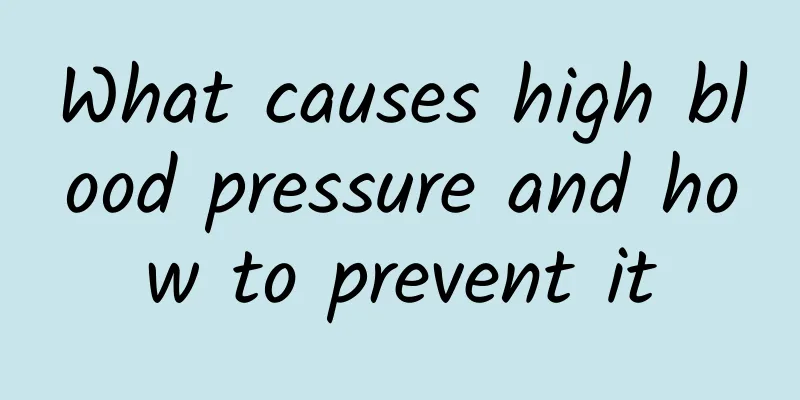What causes high blood pressure and how to prevent it

|
Hypertension, a seemingly silent "killer", is gradually becoming a major challenge to global public health. It not only affects people's quality of life, but is also the main cause of many serious diseases such as heart disease, stroke, and kidney disease. 1. Definition and classification of hypertension Hypertension, also known as hypertension, is a phenomenon of persistent high blood pressure caused by various factors. According to the different causes, hypertension can be divided into two categories: primary hypertension and secondary hypertension. Primary hypertension accounts for the vast majority of hypertensive patients. Its pathogenesis has not yet been fully clarified and may be related to various factors such as genetics, environment, and lifestyle. Secondary hypertension is hypertension caused by certain diseases or causes, such as glomerulonephritis, renal artery stenosis, etc. 2. Causes of Hypertension The formation of hypertension is a complex process with multiple factors and links, mainly including the following aspects: 1. Genetic factors: Genetic factors play an important role in the development of hypertension. Patients with a family history of hypertension have a significantly increased risk of developing hypertension in their offspring. This may be related to certain mutations in genetic genes, which may affect the normal function of the blood pressure regulation mechanism. 2. Age factor: As we age, the elasticity of our blood vessels gradually decreases, and the blood vessel walls gradually thicken, leading to increased blood pressure. Therefore, the incidence of hypertension usually increases with age. 3. Unhealthy lifestyle: Unhealthy lifestyle is one of the important causes of high blood pressure, including high-salt diet, high-fat diet, lack of exercise, long-term smoking and drinking, etc. These factors will affect the normal regulation of blood pressure and increase the risk of high blood pressure. 4. Environmental factors: Environmental factors may also affect the occurrence of hypertension. For example, long-term exposure to adverse environments such as noise and air pollution may lead to high blood pressure. 5. Other factors: Some chronic diseases, such as diabetes, obesity, etc., and the use of certain drugs, such as hormonal drugs, contraceptives, etc., may also lead to the occurrence of hypertension. 3. The harm of high blood pressure High blood pressure itself may not be immediately fatal, but it can quietly damage various organs and systems of the human body. Long-term high blood pressure can lead to vascular lesions in important organs such as the heart, brain, and kidneys, which in turn can cause serious consequences such as heart disease, stroke, and kidney disease. Therefore, high blood pressure is regarded as a potential "killer" and poses a serious threat to people's health. 4. Prevention strategies for hypertension In view of the causes of high blood pressure, we can adopt the following series of prevention strategies: 1. Adjust the diet structure: Diet is one of the important factors affecting blood pressure. In order to prevent high blood pressure, we should adjust the diet structure, reduce the intake of salt, fat and sugar, and increase the intake of vegetables, fruits and whole grains. The daily salt intake should be controlled below 5 grams, and excessive intake of high-salt foods such as pickled foods and fast food should be avoided. At the same time, we should also choose foods rich in dietary fiber, such as whole grains, vegetables, fruits, etc., which will help control weight and blood sugar. 2. Exercise in moderation: Exercise is one of the important means to prevent hypertension. Moderate exercise can promote blood circulation, improve cardiopulmonary function, and lower blood pressure. It is recommended to do at least 150 minutes of moderate-intensity aerobic exercise per week, such as brisk walking, jogging, swimming, etc. In addition, you can also try some strength training to enhance muscle strength and increase basal metabolic rate. 3. Control your weight: Obesity is an important risk factor for hypertension. In order to prevent hypertension, we should control our weight and avoid excessive obesity. It is recommended to control weight through a reasonable diet and moderate exercise, and avoid excessive intake of high-calorie foods and drinks. 4. Quit smoking and limit alcohol consumption: Tobacco and alcohol have a significant effect on increasing blood pressure. Long-term smoking and drinking will increase the risk of high blood pressure. Therefore, we should quit smoking and limit alcohol consumption as soon as possible to avoid excessive intake of alcohol and tobacco. 5. Maintain a good attitude: Long-term psychological stress can cause the body to produce a stress response and increase blood pressure. Therefore, we should maintain a calm mind and avoid excessive tension and anxiety. We can relax and relieve stress through meditation, deep breathing, listening to music, etc. 6. Regular physical examinations: Regular physical examinations can detect the presence and development of hypertension early. Especially for high-risk groups such as those with a family history of hypertension, obesity, and high-salt diets, blood pressure monitoring should be performed regularly. Once high blood pressure is found, seek medical attention in a timely manner and receive professional diagnosis and treatment. V. Summary and Outlook Hypertension is a chronic disease that requires long-term treatment and management. By understanding its causes, taking preventive measures, and strengthening self-management, we can effectively control hypertension and reduce the risk of complications. In the future, with the continuous advancement of medical technology and the improvement of people's health awareness, I believe that the prevention and control of hypertension will achieve more significant results. Author: Li Yanchao Yongnian District Traditional Chinese Medicine Hospital Handan, Hebei |
<<: If the diseased tooth no longer hurts, does that mean it has healed itself?
>>: Science Vientiane's first vaccine and artemisinin
Recommend
Can pregnant women eat purple sweet potatoes?
Purple sweet potato is a food we often eat, not o...
Six days after taking birth control pills, bloody vaginal discharge
Birth control pills are a method of contraception...
What are the symptoms of having no uterus?
Many women have a phenomenon of underdevelopment ...
Causes of yellow discharge during pregnancy
Pregnancy is something that every woman must go t...
4 bad habits that make women unable to keep blood
Anemia often occurs in women. Some women suffer f...
Will constipation in early pregnancy cause miscarriage?
I believe many people have experienced constipati...
A few minutes before going to bed, let you easily lose belly fat
Having a flat and firm belly is what every woman ...
Can the enlarged feet during pregnancy be restored?
After pregnancy, a woman's body will undergo ...
Who touched your breasts?
Breasts are a woman's second appearance besid...
My aunt is very dark, what's wrong?
In addition to observing whether each menstrual p...
Eating longan will cause your period to be very heavy
For women, when they have their period, the body ...
10 facts about women's private parts
A lot of research has been done on the female vag...
What should I do if there is a pimple on my vulva?
The vulva is the part of the reproductive system ...
Shocking! The death of a famous writer was actually related to this "silent killer". Be careful in winter!
"I will leave you quietly, ... I think it wi...
What happens to your skin after menopause?
After menopause, women will naturally feel that t...









